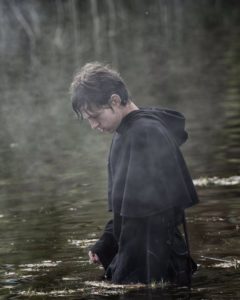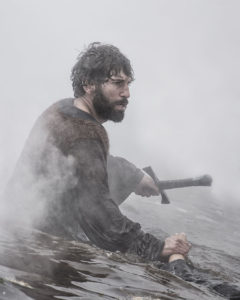PILGRIMAGE tells a dour tale of faith and fanaticism. Set in 13th-century Ireland, it blends mysticism with realpolitik in a time and place so distant from ours that a subtext of imperialism might be almost too subtle, while the vicious commonplaces of summary justice, revenge, and casual violence are all too vivid

Tom Holland
A prologue set in 5th-century Cappadocia sets the stage. An old man wearing a chi-rho version of the cross is being stoned in gruesome detail. As the final, fatal blow is about to be delivered, thunder claps in this desert locale, and we are transported to the shores of Ireland, and into the company of a fresh-faced monk Diarmuid (Tom Holland), who is waging barely successful war against the clams he is harvesting. As he nurses his wounds, he ponders aloud the received wisdom of the animal kingdom’s role in the Christian universe, and what the first person to eat a clam might have been thinking to find them a viable foodstuff. His companion is a hulking mute (Jon Bernthal), and this will not be the last time that the two of them question God’s plan, though the queries will become less full of wonder as events become more dire.
The monastery in which Diarmiud dwells, the only home he’s ever known, is also the repository of a sacred relic, tied to our prologue. It’s not just an object of veneration this relics, it is also one that reigns destruction on anyone who touches it without having the dispensation of a pure heart. In fact, the monks guarding it keep it wrapped in sheepskin and submerged in the icy waters of the Atlantic for everyone’s well-being. It is for this relic that the Cistercian Brother Geraldus (Stanley Weber) has ventured to this remote place from the comforts civilization in France, having been sent by the Pope himself to bring the relic back to Rome in order to inspire the faithful, and destroy both the infidel and the heretic plaguing his pontificate. The eponymous pilgrimage ensues, with the abbot (Donncha Crowley) sending intellectual Brother Cathal (Hugh O’Conor), hot-tempered Brother Rua (Rúaidhrí Conroy), and the monastary’s herbalist Brother Ciarán (John Lynch), for protection, as well as Diarmiud, for a chance to see the world, and the mute to do the heavy lifting that such a journey entails.
Into the mist-filled forest they go, encountering fairy forts, which the Irish monks respect, and at which Geraldus sneers, and the area’s pagan inhabitants, who are waging war against the invading Normans. The battles between the two are nasty, brutal, but not short. Blades slice through craniums; limbs are hacked in twain, but with a protracted sawing motion. The camera cuts away, but not before the gory mayhem has a chance to register. A band of those very Normans, led by a world-weary Baron de Merville (Eric Godon) and his imperious son (Richard Armitage), are tasked with making sure that the monks deliver the relic, but the longer the monks stay with them, the less sanguine they are about the arrangement. The Baron may be looking for absolution by doing this favor for His Holiness after a life waging war, but his son is more of a cipher, and not a friendly one. The protagonists make their way through the dark woods, a metaphor if we’re looking for one, of the dark recesses lurking in some souls, waging battle, literal and spiritual, as they forge on to Waterford, and safe transit back to civilization.

John Bernthal
Holland, an actor of excellent empathy, is perfect as a devout young man for whom faith has come easily, but is now seeing his ideals challenged and crushed at every turn., while Berenthal evokes both a bestial nature and a tortured soul touched by grace. By the time Brother Geraldus offers the mysterious mute a place at the right hand of God in exchange for martyrdom, Diarmiud’s spontaneous rebellion against everything he has treasured until then is a thing both satisfying and wrenching for us to see. The film has carefully brought us to this point, showing the brutality of established institutions that have long forgotten the souls with which they have been entrusted, yet not allowing us to give up on human nature as a whole. Or even in the miraculous.
PILGRIMAGE echoes John Boorman’s EXCALIBUR in it devotion to realism. That does not stop the film itself from finding a kind of transcendence as entrails are violated and lightning strikes with unsettling purpose. There is a meditative element at work in the hushed tones that permeate one monk’s spiritual journey from darkness to light to something for which he does not have a name, only a realization as electrifying as that lightning strike.
Your Thoughts?